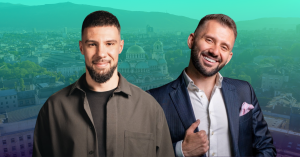Andra Pintican is a strong voice in Romania on the topic of healthy work standards. With over 15 years of experience in HR and career counseling, she aims to help expose toxic situations in the labor market and improve HR function. As our conversation began, I eagerly asked about which corporate mistakes have led to employees’ recent collapse in trust, to which Andra clarified: employers have hardly ever won that trust, to begin with.
“We look at everything that happened as a collapse in trust simply because we hear of great employers that laid off people in a very unsettling way. Big brands that built their image as good employers for years jeopardized everything with these actions. But truth be told, most companies in Romania do not have such a reputation. Some work really hard on building it now, some don’t even understand the importance of building an employer brand. And some still consider this to be just a marketing stunt. Yet Employer Branding comes from the inside. If there is no psychological safety inside the organization, there will not be an authentic employer brand visible on the outside,” she tells me.
It’s not surprising then that 74% of employees would not recommend their company as an employer, according to an employment market survey in Romania organized by Scoala de HR, a human resources services company that creates programs for introduction, specialization, and leadership in the HR practice.
Through her endeavors, Andra is trying to assist companies in building people-centered companies and support employees and candidates in designing their career path according to their life vision.
Today, we dive deep into the role of building a healthy culture, how practices and tools such as organizational psychology will help, how a strong HR function looks like, and what is her best career advice for the times we’re living.
The Recursive: What is the role of culture building and integration in an organization? Do you feel it is neglected overall, and why/why not?
Andra Pintican, Scoala de HR: To understand a culture, we must first zoom in on the individual. In order for a person to thrive (at work and in their private life), they need to feel safe. Safety is translated by many employees as good pay, a flexible schedule, a boss that doesn’t put pressure on work, and so on.
However, in our subconscious mind things are very different. We all run on mental programs that have been inherited from our cultural environment, programs that constantly tell our brains we are in danger, that we are not good enough, or that we will be rejected.
And people are simply not aware that they are operating from these mental models. So, we need to understand that reality and perception of reality are two very different things when building culture.
What do people bring to the “culture table”? It’s not just their conscious mind, it’s also all their limiting beliefs and mental models. Meaning that we will try really hard in the HR & MGMT office to orchestrate a healthy culture, but we won’t understand why people don’t respond the way we expected!
Well, we need to start using organizational psychology to understand the individual first, sometimes better than he understands himself. Then we need to understand the dynamics of relations among employees. Another land mine is filled with automatic pilot reactions that will reflect in the quality of our organization.
Looking at our cultural perception of work, we will understand that people don’t just naturally create a life vision and plan ahead with their best interests in mind. Most of the time their “vision” is a plan to keep them out of danger, not a growth strategy. And this kind of fixed mindset is not what brings performance to the table.
So, if as an organization, we are thriving for innovation, performance, and results that will make us lead our market segment, we need to understand that these are not delivered by people constantly feeling unsafe.
Elevating people from a fixed to a growth mindset and then to a beneficial organizational mindset is something you do through a carefully orchestrated learning culture!
You have juggled leadership roles including CMO, HR Director, and CEO. How do you define leadership for yourself, and what practices have proved most useful along the way?
My role as a CEO was brief. Exactly because the organization saw the role in a very different way than I did.
My first move in the role was to make sure every person had the right role, and that they worked according to their identity. I was what you may call a transformational leader, meaning that my first priority was to make sure every employee has a growth path set clear.
In 3 months we got better results than in the past year before joining, with the same team. Not because I was CEO, but because people were now in a role where they felt they could put their skills to work. And because they felt safe to speak their mind, and disagree with me or their peers on matters.
As HR Director, my main concern was to make sure my team understands the critical role HR plays in the organization. And that they felt respected and important in what they do.
One thing that brought my team a lot of benefits was the fact that I trusted they could do it, even when they didn’t.
Our creed as a team was that we believe in the competencies of our colleagues and we support them when they need someone to believe in them. It always paid off. People were just thriving in situations they would usually think they would not stand a chance.
But to sum it up, I think the # 1 practice was that I treated my team members as capable adults. It’s just this magic that happens when someone decides to see the best in you: you start seeing and being what they see, in time!
You are currently running your own business. Why have you made this jump to the entrepreneurship side, and what problem do you aim to address with Scoala de HR?
After jumping from toxic company to toxic company, I decided I need to stop and “smell the roses” of entrepreneurship. At that time I was 100% sure there are no good organizations in Romania. I am glad I discovered that is not true and I now work with companies, from a consultant perspective, that leads the change in the market of healthy organizations.
Scoala de HR has a very clear mission. Elevating Human Resources. Not just the department, but all the human capital of the organization. We educate the market on building people centered organizations and bring organizational excellence to the table.
HR will never be the same again. And our learning programs for HR professionals prove it. If you come to learn HR with us, you learn several other disciplines on the side. Because HR without organizational psychology, marketing, design thinking, data, change management, and many more….simply does not work anymore!
What are some misconceptions or bad practices about HR and its role in an organization that you have encountered too often?
I think the whole HR role in Romania is a misconception. Most organizations think HR is just the admin role.
We do not see HR as a change agent in the organization just yet. We do not see it as a source of value. In the past 3 years, out of more than 300 students, less than 10% were supported by the company to enroll in our programs.
HR people pay for their education on their own, as many companies do not invest in this department. We still can’t see the added value of this department, perhaps because just for the past few years we started transforming this role in a more strategic way.
How can the HR role be elevated, and how are you tackling this at Scoala de HR?
Simply by understanding the pivotal role they play in shifting the company’s mindset and collective behaviors.
The way we look at work as individuals is changing. We are completely shifting life priorities and making behavioral changes. Someone needs to keep an eye on employee needs, reactions, and relations. Someone needs to see how all these changes may affect the current situation the company is in.
A very simple example is the list of benefits a company gives. Most of the time, it’s just a copy-paste list from the competition. Well, someone needs to create focus groups, engage with employees in understanding their life dynamics and see what benefits they really need. So in this way, we make sure that we get a maximum return on investment from our benefits budget. People will not appreciate that you spend money on something they don’t use. But they will be engaged in a company that truly seeks to fulfill their needs.
This is just an example. There are many other ways HR can help maximize the return on investment in the human asset of the company.
What have been the biggest shifts you have noticed in the Romanian job market since joining the HR department? What should people have in mind when they apply for a job today?
In the past 15 years, I’ve seen many shifts! But the most important one I would say is the fact that people stopped idolizing work. Work used to be this sacred thing that runs our life, plans, family, health, and social life. Now we just see it’s just another area of our life. That’s it!
Regardless of the industry you are in, before making any professional decisions, go through this list:
- Who do I want to become as a human being?
- How do I want to live my next 20-30 years of life?
- What kind of job and work environment would allow me to have access to this life and become this person?
- What are the working standards I need to set up in order to ensure a healthy relationship with my work?
- How can I communicate these work standards in an assertive way to my manager and peers?
I’ve recently read that despite being underrepresented in the tech world, women were more affected by tech layoffs. What is your main advice for young women at the start of their career who are considering tech and/or entrepreneurship, yet fear this existing imbalance?
I always say that in Romania we don’t discriminate on gender pay. We pay everyone equally bad.
But in a more serious approach now, I think we need to start understanding that we have rights and we have to start finding our tribe. When we started the “1000 – Women in Entrepreneurship Program”, where we granted 1000 women access to entrepreneurship learning programs, we saw how badly women needed a safe space to develop. A space where their voice can be heard and get the support they need to bring their ideas to life.
So, my advice to women is:
- Get a clear understanding of what you want and why you want it;
- Find the environment that can support you to get it;
- Find the people that can challenge your mind to think in new ways;
- If you let yourself be defined by cultural biases, people will filter you through them;
- Trust your true self. Give it a voice and let it be as loud as it can get!
- Always ask for your rights!








